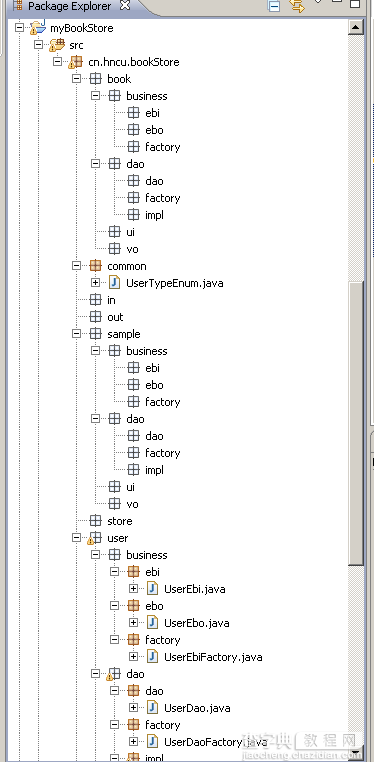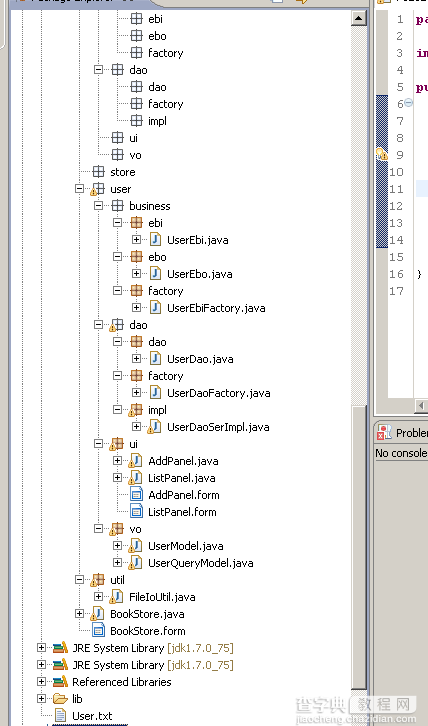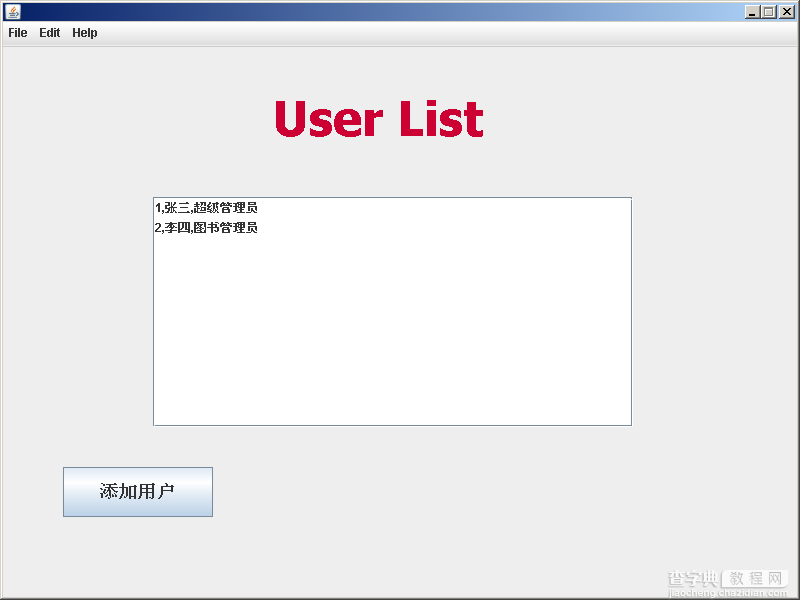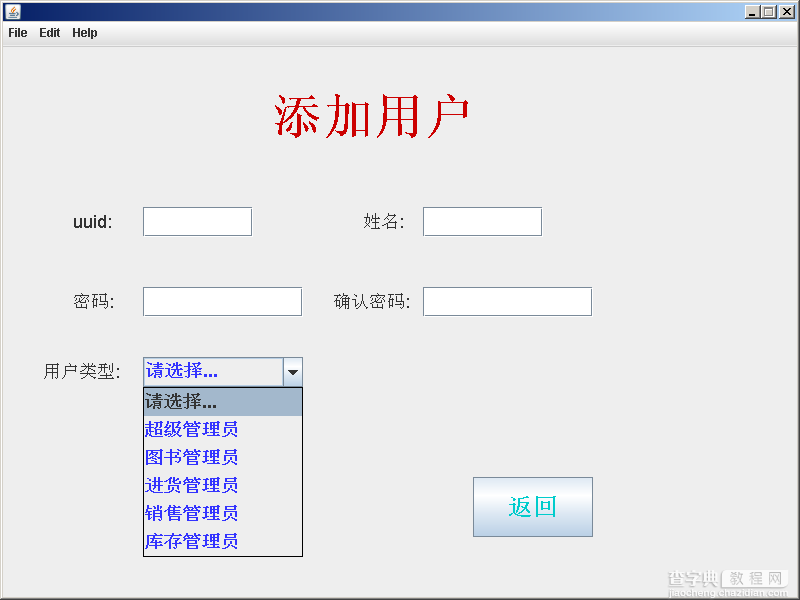Java-单机版的书店管理系统(练习设计模块和思想_系列 一 ): http://www.jb51.net/article/91004.htm
介绍
小提示:上面一点有一个目录,可以快速定位到自己需要看的类。
今天对前面的代码有了小小的修改,让代码更加完善了一点。
至于用户唯一标识码uuid,会在以后修改成程序内部生成的,
现在的uuid还是由用户自己设置。
今天对这个程序,添加了用户界面的表现层的一部分,增加了公共类 枚举,
下面贴出目前我写的这个程序的全部代码:我会逐渐的写完这个程序的,请大家放心!(需要实现的功能在这个书店管理系统的系列一可以找到,我为这个系列的文章已经分类了,方便大家寻找)
这个系列的博客是不会断的。
现在的代码分层:


现在的程序运行后的图片:
我按照从目录上面到下面的顺序贴出代码:
请注意!这个代码顺序并不是我写代码的顺序!
如果你们要参考我的写,请不要按照我贴的代码的顺序。
应该先写公共类,工具类。
再次:数据层类—>逻辑层类—>表现层类
现在程序运行后的部分图片:


UserTypeEnum类:
cn.hncu.bookStore.common;
UserTypeEnum类:
package cn.hncu.bookStore.common; /** * 功能:用户类型的枚举!<br/> * 定义在公共模块。<br/> * 变量:<br/> * ADMIN(1,"超级管理员"),<br/> * BOOK(2,"图书管理员"),<br/> * IN(3,"进货管理员"),<br/> * OUT(4,"销售管理员"),<br/> * STOCK(5,"库存管理员");<br/> * @author chx * @version 1.0 */ public enum UserTypeEnum { ADMIN(1,"超级管理员"), BOOK(2,"图书管理员"), IN(3,"进货管理员"), OUT(4,"销售管理员"), STOCK(5,"库存管理员"); private final int type; private final String name; /** * 初始化枚举变量名字 * @param type---枚举变量对应的整型数字 * @param name---枚举变量对应的String型名字 */ private UserTypeEnum(int type, String name) { this.type=type; this.name=name; } /** * 得到当前枚举变量的数字 * @return---type-编号 */ public int getType() { return type; } /** * 得到当前枚举变量的中文名字 * @return---name-中文名字 */ public String getName() { return name; } /** * 根据枚举变量的int数字得到数字对应的枚举变量的中文名字 * @param type---需要传入的int型参数 * @return ---如果存在这样的数字对应的枚举变量,就返回这个枚举变量的中文名字。 * <br/>---如果不存在这样的数字对应的枚举变量,就抛出一个异常信息。 */ public static String getNameByType(int type){ for(UserTypeEnum userType:UserTypeEnum.values()){ if(userType.getType()==type){ return userType.getName(); } } throw new IllegalArgumentException("枚举中没有对应的用户类型:"+type); } /** * 根据枚举变量的name中文名字得到name对应的枚举变量的int型type * @param name---需要传入的String型名字 * @return ---如果存在这样的名字对应的枚举变量,就返回这个枚举变量对应的type-int * <br/> ---如果不存在这样的名字对应的枚举变量,就抛出一个异常信息 */ public static int getTypeByName(String name){ for(UserTypeEnum userType:UserTypeEnum.values()){ if(userType.getName().equals(name)){ return userType.getType(); } } throw new IllegalArgumentException("枚举中没有对应的用户类型:"+name); } }
UserEbi接口:
cn.hncu.bookStore.user.business.ebi;
UserEbi接口:
package cn.hncu.bookStore.user.business.ebi; import java.util.List; import cn.hncu.bookStore.user.vo.UserModel; import cn.hncu.bookStore.user.vo.UserQueryModel; /** * 逻辑层的接口 * * @author chx * @version 1.0 */ public interface UserEbi { /** * 功能:创建一个用户 * * @param userModel---将要创建的用户数据 * @return---true表示创建成功,false表示创建失败 */ public boolean create(UserModel user); /** * 功能:根据用户的唯一标识码uuid删除一个用户 * * @param uuid---用户唯一的标识码,每个用户都不会相同 * @return---true表示删除成功,false表示删除失败 */ public boolean delete(String uuid); /** * 功能:修改用户的数据资料 * * @param user---需要修改的用户数据参数名 * @return 返回true-表示修改成功了,返回false-表示修改失败 */ public boolean update(UserModel user); /** * 功能:得到所有的用户数据 * * @return---一个UserModel集合,也就是用户的数据 */ public List<UserModel> getAll(); /** * 功能:按照一定的查找条件进行查找, * <br/> * 把满足查找条件的用户数据返回。 * * @param uqm---被封装的查找条件 * @return---满足查找条件的用户数据集合 */ public List<UserModel> getbyCondition(UserQueryModel uqm); /** * 功能:得到一个确定的用户的数据资料 * * @param uuid---用户唯一标识码 * @return ---返回按这个唯一标识码找到的用户数据 */ public UserModel getSingle(String uuid); }
UserEbo类:
cn.hncu.bookStore.user.business.ebo;
UserEbo类:
package cn.hncu.bookStore.user.business.ebo; import java.util.List; import cn.hncu.bookStore.user.business.ebi.UserEbi; import cn.hncu.bookStore.user.dao.dao.UserDao; import cn.hncu.bookStore.user.dao.factory.UserDaoFactory; import cn.hncu.bookStore.user.vo.UserModel; import cn.hncu.bookStore.user.vo.UserQueryModel; public class UserEbo implements UserEbi{ private UserDao dao = UserDaoFactory.getUserDao(); @Override public boolean create(UserModel user) { return dao.create(user); } @Override public boolean delete(String uuid) { return dao.delete(uuid); } @Override public boolean update(UserModel user) { return dao.update(user); } @Override public List<UserModel> getAll() { return dao.getAll(); } @Override public List<UserModel> getbyCondition(UserQueryModel uqm) { // TODO Auto-generated method stub return null; } @Override public UserModel getSingle(String uuid) { return dao.getSingle(uuid); } }
UserEbiFactory类:
cn.hncu.bookStore.user.business.factory;
UserEbiFactory类:
package cn.hncu.bookStore.user.business.factory; import cn.hncu.bookStore.user.business.ebi.UserEbi; import cn.hncu.bookStore.user.business.ebo.UserEbo; public class UserEbiFactory { public static UserEbi getUserEbi(){ return new UserEbo(); } }
UserDao接口:
cn.hncu.bookStore.user.dao.dao;
UserDao接口:
package cn.hncu.bookStore.user.dao.dao; import java.util.List; import cn.hncu.bookStore.user.vo.UserModel; import cn.hncu.bookStore.user.vo.UserQueryModel; /** * * @author 陈浩翔 * * @version 1.0 * 用户模块的数据层接口 */ public interface UserDao { /** * 功能:创建一个用户 * * @param userModel---将要创建的用户数据 * @return---true表示创建成功,false表示创建失败 */ public boolean create(UserModel user); /** * 功能:根据用户的唯一标识码uuid删除一个用户 * * @param uuid---用户唯一的标识码,每个用户都不会相同 * @return---true表示删除成功,false表示删除失败 */ public boolean delete(String uuid); /** * 功能:修改用户的数据资料 * * @param user---需要修改的用户数据参数名 * @return 返回true-表示修改成功了,返回false-表示修改失败 */ public boolean update(UserModel user); /** * 功能:得到所有的用户数据 * * @return---一个UserModel集合,也就是用户的数据 */ public List<UserModel> getAll(); /** * 功能:按照一定的查找条件进行查找, * <br/> * 把满足查找条件的用户数据返回。 * * @param uqm---被封装的查找条件 * @return---满足查找条件的用户数据集合 */ public List<UserModel> getbyCondition(UserQueryModel uqm); /** * 功能:得到一个确定的用户的数据资料 * * @param uuid---用户唯一标识码 * @return ---返回按这个唯一标识码找到的用户数据 */ public UserModel getSingle(String uuid); }
UserDaoFactory类:
cn.hncu.bookStore.user.dao.factory;
UserDaoFactory类:
package cn.hncu.bookStore.user.dao.factory; import cn.hncu.bookStore.user.dao.dao.UserDao; import cn.hncu.bookStore.user.dao.impl.UserDaoSerImpl; /** * 工厂方法<br/> * new 一个dao的实例 * @author 陈浩翔 * * @version 1.0 * */ public class UserDaoFactory { public static UserDao getUserDao(){ return new UserDaoSerImpl(); } }
UserDaoSerImpl类:
cn.hncu.bookStore.user.dao.impl;
UserDaoSerImpl类:
package cn.hncu.bookStore.user.dao.impl; import java.util.ArrayList; import java.util.List; import cn.hncu.bookStore.user.dao.dao.UserDao; import cn.hncu.bookStore.user.vo.UserModel; import cn.hncu.bookStore.user.vo.UserQueryModel; import cn.hncu.bookStore.util.FileIoUtil; /** * <br/> * 对用户数据处理的具体实现类 ----实现了UserDao接口 * * @author 陈浩翔 * * @version 1.0 */ public class UserDaoSerImpl implements UserDao { private static final String FILE_NAME = "User.txt"; @Override public boolean create(UserModel user) { // 1先把已有的数据反序列化(读)出来 List<UserModel> list = FileIoUtil.readFormFile(FILE_NAME); // 2判断该用户是否已经存在,再决定是否创建 for (UserModel userModel : list) { // 如果2个用户的uuid相等,用户就是相同的 if (userModel.getUuid().equals(user.getUuid())) { return false;// 用户已经存在了,返回false } } // 3如果用户不存在,就创建 list.add(user); FileIoUtil.write2file(list, FILE_NAME); return true;// 创建成功,返回true } @Override public boolean delete(String uuid) { // 1先把已有的数据反序列化(读)出来 List<UserModel> list = FileIoUtil.readFormFile(FILE_NAME); // 2判断该用户是否已经存在,再决定是否删除 // for(int i=0;i<list.size();i++){ // if(list.get(i).getUuid().equals(uuid)){ // list.remove(i); // FileIoUtil.write2file(list, FILE_NAME); // return true; // } // } for (UserModel userModel : list) { // 如果2个用户的uuid相等,用户就是相同的 if (userModel.getUuid().equals(uuid)) { list.remove(userModel); FileIoUtil.write2file(list, FILE_NAME); // 删除成功,返回true return true; } } // 3用户不存在 // 删除失败,返回false return false; } @Override public boolean update(UserModel user) { // 1先把已有的数据反序列化(读)出来 List<UserModel> list = FileIoUtil.readFormFile(FILE_NAME); // 2判断该用户是否已经存在,再决定是否创建 for (int i = 0; i < list.size(); i++) { // uuid是不能改的,通过uuid来找到那个用户数据,再修改就ok了 if (list.get(i).getUuid().equals(user.getUuid())) { // 将找到的用户修改成user list.set(i, user); FileIoUtil.write2file(list, FILE_NAME); // 找到用户,返回true return true; } } // 3若该用户不存在,则修改失败 return false; } @Override public List<UserModel> getAll() { return FileIoUtil.readFormFile(FILE_NAME); } @Override public List<UserModel> getbyCondition(UserQueryModel uqm) { // TODO Auto-generated method stub return null; } @Override public UserModel getSingle(String uuid) { // 1先把已有的数据反序列化(读)出来 List<UserModel> list = FileIoUtil.readFormFile(FILE_NAME); // 2判断该用户是否已经存在,存在就返回那个用户 for (int i = 0; i < list.size(); i++) { if (list.get(i).getUuid().equals(uuid)) { return list.get(i); } } // 3若该用户不存在,返回null return null; } }
AddPanel类:
cn.hncu.bookStore.user.ui;
AddPanel类:
/* * AddPanel.java * * Created on __DATE__, __TIME__ */ package cn.hncu.bookStore.user.ui; import javax.swing.JFrame; import javax.swing.JOptionPane; import cn.hncu.bookStore.common.UserTypeEnum; import cn.hncu.bookStore.user.business.ebi.UserEbi; import cn.hncu.bookStore.user.business.factory.UserEbiFactory; import cn.hncu.bookStore.user.vo.UserModel; import cn.hncu.bookStore.util.FileIoUtil; /** * * @author 陈浩翔 */ public class AddPanel extends javax.swing.JPanel { private JFrame mainFrame = null; /** Creates new form AddPanel */ public AddPanel(JFrame mainFrame) { this.mainFrame = mainFrame; initComponents(); myInitData(); } private void myInitData() { for (UserTypeEnum type : UserTypeEnum.values()) { combType.addItem(type.getName()); } } /** This method is called from within the constructor to * initialize the form. * WARNING: Do NOT modify this code. The content of this method is * always regenerated by the Form Editor. */ //GEN-BEGIN:initComponents // <editor-fold defaultstate="collapsed" desc="Generated Code"> private void initComponents() { jLabel1 = new javax.swing.JLabel(); jLabel2 = new javax.swing.JLabel(); tfdName = new javax.swing.JTextField(); jLabel3 = new javax.swing.JLabel(); tfdUuid = new javax.swing.JTextField(); jLabel4 = new javax.swing.JLabel(); tfdPwd2 = new javax.swing.JPasswordField(); jLabel5 = new javax.swing.JLabel(); jLabel6 = new javax.swing.JLabel(); combType = new javax.swing.JComboBox(); tfdPwd = new javax.swing.JPasswordField(); btnAdd = new javax.swing.JButton(); btnBack = new javax.swing.JButton(); setMinimumSize(new java.awt.Dimension(800, 600)); setLayout(null); jLabel1.setFont(new java.awt.Font("微软雅黑", 1, 48)); jLabel1.setForeground(new java.awt.Color(204, 0, 0)); jLabel1.setText("u6dfbu52a0u7528u6237"); add(jLabel1); jLabel1.setBounds(270, 30, 230, 80); jLabel2.setFont(new java.awt.Font("微软雅黑", 0, 18)); jLabel2.setText("u7528u6237u7c7bu578b:"); add(jLabel2); jLabel2.setBounds(40, 310, 90, 30); tfdName.setFont(new java.awt.Font("Dialog", 1, 18)); tfdName.setAutoscrolls(false); add(tfdName); tfdName.setBounds(420, 160, 120, 30); jLabel3.setFont(new java.awt.Font("微软雅黑", 0, 18)); jLabel3.setText("uuid:"); add(jLabel3); jLabel3.setBounds(70, 160, 50, 30); tfdUuid.setFont(new java.awt.Font("Dialog", 0, 11)); add(tfdUuid); tfdUuid.setBounds(140, 160, 110, 30); jLabel4.setFont(new java.awt.Font("微软雅黑", 0, 18)); jLabel4.setText("u59d3u540d:"); add(jLabel4); jLabel4.setBounds(360, 160, 50, 30); add(tfdPwd2); tfdPwd2.setBounds(420, 240, 170, 30); jLabel5.setFont(new java.awt.Font("微软雅黑", 0, 18)); jLabel5.setText("u5bc6u7801:"); add(jLabel5); jLabel5.setBounds(70, 240, 50, 30); jLabel6.setFont(new java.awt.Font("微软雅黑", 0, 18)); jLabel6.setText("u786eu8ba4u5bc6u7801:"); add(jLabel6); jLabel6.setBounds(330, 240, 90, 30); combType.setFont(new java.awt.Font("Dialog", 1, 18)); combType.setForeground(new java.awt.Color(51, 51, 255)); combType.setModel(new javax.swing.DefaultComboBoxModel( new String[] { "请选择..." })); add(combType); combType.setBounds(140, 310, 160, 30); tfdPwd.setFont(new java.awt.Font("宋体", 1, 18)); add(tfdPwd); tfdPwd.setBounds(140, 240, 160, 30); btnAdd.setFont(new java.awt.Font("Dialog", 1, 24)); btnAdd.setForeground(new java.awt.Color(0, 204, 204)); btnAdd.setText("u6dfbu52a0"); btnAdd.addActionListener(new java.awt.event.ActionListener() { public void actionPerformed(java.awt.event.ActionEvent evt) { btnAddActionPerformed(evt); } }); add(btnAdd); btnAdd.setBounds(140, 430, 120, 60); btnBack.setFont(new java.awt.Font("Dialog", 1, 24)); btnBack.setForeground(new java.awt.Color(0, 204, 204)); btnBack.setText("u8fd4u56de"); btnBack.addActionListener(new java.awt.event.ActionListener() { public void actionPerformed(java.awt.event.ActionEvent evt) { btnBackActionPerformed(evt); } }); add(btnBack); btnBack.setBounds(470, 430, 120, 60); }// </editor-fold> //GEN-END:initComponents private void back() { mainFrame.setContentPane(new ListPanel(mainFrame)); mainFrame.validate(); } /** *监听返回按钮 * @param 返回按钮的点击监听 */ private void btnBackActionPerformed(java.awt.event.ActionEvent evt) { back(); } private void btnAddActionPerformed(java.awt.event.ActionEvent evt) { //1收集参数 String uuid = tfdUuid.getText(); String name = tfdName.getText(); String pwd = new String(tfdPwd.getPassword()); String pwd2 = new String(tfdPwd2.getPassword()); if (!pwd.equals(pwd2)) { JOptionPane.showMessageDialog(null, "两次密码输入不一致,请重新输入!"); return; } int type = 0; try { type = UserTypeEnum.getTypeByName(combType.getSelectedItem() .toString()); } catch (Exception e) { JOptionPane.showMessageDialog(null, "请指定用户类型!"); return; } //2组织参数 UserModel user = new UserModel(); user.setName(name); user.setPwd(pwd); user.setType(type); user.setUuid(uuid); //3调用逻辑层 UserEbi ebi = UserEbiFactory.getUserEbi(); //4根据调用返回结果导向不同页面 if (ebi.create(user)) { back(); } else { JOptionPane.showMessageDialog(null, "该用户已经存在!"); } } //GEN-BEGIN:variables // Variables declaration - do not modify private javax.swing.JButton btnAdd; private javax.swing.JButton btnBack; private javax.swing.JComboBox combType; private javax.swing.JLabel jLabel1; private javax.swing.JLabel jLabel2; private javax.swing.JLabel jLabel3; private javax.swing.JLabel jLabel4; private javax.swing.JLabel jLabel5; private javax.swing.JLabel jLabel6; private javax.swing.JTextField tfdName; private javax.swing.JPasswordField tfdPwd; private javax.swing.JPasswordField tfdPwd2; private javax.swing.JTextField tfdUuid; // End of variables declaration//GEN-END:variables }
ListPanel类:
cn.hncu.bookStore.user.ui;
ListPanel类:
/* * ListPanel.java * * Created on __DATE__, __TIME__ */ package cn.hncu.bookStore.user.ui; import java.util.List; import javax.swing.JFrame; import cn.hncu.bookStore.user.business.ebi.UserEbi; import cn.hncu.bookStore.user.business.factory.UserEbiFactory; import cn.hncu.bookStore.user.vo.UserModel; /** * 表现层-用户列表面板 * * @author 陈浩翔 * @version 1.0 */ public class ListPanel extends javax.swing.JPanel { private JFrame mainFrame = null; /** Creates new form ListPanel */ public ListPanel(JFrame mainFrame) { this.mainFrame = mainFrame; initComponents(); myInitData(); } /** * 读取所有用户并添加进列表 */ private void myInitData() { UserEbi user = UserEbiFactory.getUserEbi(); List<UserModel> list = user.getAll(); userLists.setListData(list.toArray()); } /** This method is called from within the constructor to * initialize the form. * WARNING: Do NOT modify this code. The content of this method is * always regenerated by the Form Editor. */ //GEN-BEGIN:initComponents // <editor-fold defaultstate="collapsed" desc="Generated Code"> private void initComponents() { jScrollPane1 = new javax.swing.JScrollPane(); userLists = new javax.swing.JList(); jLabel1 = new javax.swing.JLabel(); btnToAdd = new javax.swing.JButton(); setMinimumSize(new java.awt.Dimension(800, 600)); setLayout(null); userLists.setModel(new javax.swing.AbstractListModel() { String[] strings = { "" }; public int getSize() { return strings.length; } public Object getElementAt(int i) { return strings[i]; } }); jScrollPane1.setViewportView(userLists); add(jScrollPane1); jScrollPane1.setBounds(150, 150, 480, 230); jLabel1.setFont(new java.awt.Font("Tahoma", 1, 48)); jLabel1.setForeground(new java.awt.Color(204, 0, 51)); jLabel1.setText("User List"); add(jLabel1); jLabel1.setBounds(270, 30, 260, 80); btnToAdd.setFont(new java.awt.Font("Dialog", 1, 18)); btnToAdd.setText("u6dfbu52a0u7528u6237"); btnToAdd.addActionListener(new java.awt.event.ActionListener() { public void actionPerformed(java.awt.event.ActionEvent evt) { btnToAddActionPerformed(evt); } }); add(btnToAdd); btnToAdd.setBounds(60, 420, 150, 50); }// </editor-fold> //GEN-END:initComponents private void btnToAddActionPerformed(java.awt.event.ActionEvent evt) { mainFrame.setContentPane(new AddPanel(mainFrame)); mainFrame.validate(); } //GEN-BEGIN:variables // Variables declaration - do not modify private javax.swing.JButton btnToAdd; private javax.swing.JLabel jLabel1; private javax.swing.JScrollPane jScrollPane1; private javax.swing.JList userLists; // End of variables declaration//GEN-END:variables }
UserModel类:
cn.hncu.bookStore.user.vo;
UserModel类:
用户值对象模块:
package cn.hncu.bookStore.user.vo; import java.io.Serializable; import cn.hncu.bookStore.common.UserTypeEnum; /** * @author 陈浩翔 * @version 1.0 * * <br/> * 用于保存用户信息的值对象<br/> * 1、可序列化<br/> * 2、私有化所有变量成员,补setter-getters方法<br/> * 3、写equals和hashCode方法----用主键(uuid)唯一标识码<br/> * 4、toString方法<br/> * 5,空参构造方法<br/> */ public class UserModel implements Serializable{ private String uuid;//用户唯一标识码 private String name;//用户名 private int type;//用户类型 private String pwd;//用户密码 public UserModel() { } /** * 功能:得到uuid-用户唯一的标识码 * * @return 返回uuid-用户唯一的标识码 */ public String getUuid() { return uuid; } /** * 功能:设置uuid-用户唯一的标识码 * @param uuid-用户唯一的标识码-String型参数 */ public void setUuid(String uuid) { this.uuid = uuid; } /** * 功能:得到用户的用户名 * @return---name-用户名 */ public String getName() { return name; } /** * 功能:设置用户的用户名 * * @param name--用户设置的用户名,String型参数 */ public void setName(String name) { this.name = name; } /** * 功能:得到用户的类型: * 1——表示为admin,可以进行全部操作 * 2——表示为能操作图书模块的人员 * 3——表示为能操作进货模块的人员 * 4——表示为能操作销售模块的人员 * 5——表示为能操作库存模块的人员 * @return 用户的类型 */ public int getType() { return type; } /** * 功能:设置用户的类型: * 1——表示为admin,可以进行全部操作 * 2——表示为能操作图书模块的人员 * 3——表示为能操作进货模块的人员 * 4——表示为能操作销售模块的人员 * 5——表示为能操作库存模块的人员 * @param type--用户的类型-int型参数 */ public void setType(int type) { this.type = type; } /** *功能:得到用户的密码 * @return String型,用户的密码 */ public String getPwd() { return pwd; } /** * 功能:设置用户的密码 * @param pwd--String型参数 */ public void setPwd(String pwd) { this.pwd = pwd; } @Override public int hashCode() { final int prime = 31; int result = 1; result = prime * result + ((uuid == null) ? 0 : uuid.hashCode()); return result; } @Override public boolean equals(Object obj) { if (this == obj) return true; if (obj == null) return false; if (getClass() != obj.getClass()) return false; UserModel other = (UserModel) obj; if (uuid == null) { if (other.uuid != null) return false; } else if (!uuid.equals(other.uuid)) return false; return true; } @Override public String toString() { return uuid + "," + name + "," + UserTypeEnum.getNameByType(type); } }
UserQueryModel类:
cn.hncu.bookStore.user.vo;
UserQueryModel类:
虽然没有代码,但不能不写!这是查找用户时需要的。
原因我在系列一写了。
package cn.hncu.bookStore.user.vo; /** * * @author 陈浩翔 * * @version 1.0 */ public class UserQueryModel extends UserModel{ }
FileIoUtil类:
cn.hncu.bookStore.util;
FileIoUtil类:
package cn.hncu.bookStore.util; import java.io.File; import java.io.FileInputStream; import java.io.FileNotFoundException; import java.io.FileOutputStream; import java.io.IOException; import java.io.ObjectInputStream; import java.io.ObjectOutputStream; import java.util.ArrayList; import java.util.List; import javax.swing.JOptionPane; /** * 用户的公用数据读取写入类 * @author 陈浩翔 * * @version 1.0 */ public class FileIoUtil { public FileIoUtil() { } /** * 从数据库中读取所有的数据并返回出来 * * @param fileName:(数据表对应的文件名字) * @return 所有表的记录! */ @SuppressWarnings("unchecked")//压警告 public static<E> List<E> readFormFile(String fileName){ List<E> list = new ArrayList<E>(); final File file = new File(fileName); ObjectInputStream in =null; if(!file.exists()){ //JOptionPane.showMessageDialog(null, "数据表不存在!"); return list; } try { in = new ObjectInputStream(new FileInputStream(fileName)); try { list = (List<E>) in.readObject(); } catch (ClassNotFoundException e) { e.printStackTrace(); } } catch (FileNotFoundException e) { e.printStackTrace(); } catch (IOException e) { e.printStackTrace(); }finally{ if(in!=null){ try { in.close(); } catch (IOException e) { throw new RuntimeException("数据库关闭失败"); } } } return list; } /** * 写入一个list集合进入数据文件fileName * * @param list(需要存储的数据集合) * @param fileName(写入到哪个文件的文件名字) */ public static<E> void write2file(List<E> list, String fileName){ ObjectOutputStream out = null; try { out = new ObjectOutputStream(new FileOutputStream(fileName)); out.writeObject(list); } catch (FileNotFoundException e) { e.printStackTrace(); } catch (IOException e) { e.printStackTrace(); }finally{ if(out!=null){ try { out.close(); } catch (IOException e) { throw new RuntimeException("数据库关闭失败!"); } } } } }
BookStore类:(含main方法)
cn.hncu.bookStore;
BookStore类:
用户模块的main方法在这个类中:
/* * BookStore.java * * Created on __DATE__, __TIME__ */ package cn.hncu.bookStore; import cn.hncu.bookStore.user.ui.ListPanel; /** * * @author 陈浩翔 */ public class BookStore extends javax.swing.JFrame { /** Creates new form BookStore */ public BookStore() { initComponents(); this.setContentPane(new ListPanel(this)); this.setResizable(false);//不能缩放 this.setDefaultCloseOperation(EXIT_ON_CLOSE); } /** This method is called from within the constructor to * initialize the form. * WARNING: Do NOT modify this code. The content of this method is * always regenerated by the Form Editor. */ //GEN-BEGIN:initComponents // <editor-fold defaultstate="collapsed" desc="Generated Code"> private void initComponents() { menuBar = new javax.swing.JMenuBar(); fileMenu = new javax.swing.JMenu(); openMenuItem = new javax.swing.JMenuItem(); saveMenuItem = new javax.swing.JMenuItem(); saveAsMenuItem = new javax.swing.JMenuItem(); exitMenuItem = new javax.swing.JMenuItem(); editMenu = new javax.swing.JMenu(); cutMenuItem = new javax.swing.JMenuItem(); copyMenuItem = new javax.swing.JMenuItem(); pasteMenuItem = new javax.swing.JMenuItem(); deleteMenuItem = new javax.swing.JMenuItem(); helpMenu = new javax.swing.JMenu(); contentsMenuItem = new javax.swing.JMenuItem(); aboutMenuItem = new javax.swing.JMenuItem(); setDefaultCloseOperation(javax.swing.WindowConstants.EXIT_ON_CLOSE); setMinimumSize(new java.awt.Dimension(800, 600)); fileMenu.setText("File"); openMenuItem.setText("Open"); fileMenu.add(openMenuItem); saveMenuItem.setText("Save"); fileMenu.add(saveMenuItem); saveAsMenuItem.setText("Save As ..."); fileMenu.add(saveAsMenuItem); exitMenuItem.setText("Exit"); exitMenuItem.addActionListener(new java.awt.event.ActionListener() { public void actionPerformed(java.awt.event.ActionEvent evt) { exitMenuItemActionPerformed(evt); } }); fileMenu.add(exitMenuItem); menuBar.add(fileMenu); editMenu.setText("Edit"); cutMenuItem.setText("Cut"); editMenu.add(cutMenuItem); copyMenuItem.setText("Copy"); editMenu.add(copyMenuItem); pasteMenuItem.setText("Paste"); editMenu.add(pasteMenuItem); deleteMenuItem.setText("Delete"); editMenu.add(deleteMenuItem); menuBar.add(editMenu); helpMenu.setText("Help"); contentsMenuItem.setText("Contents"); helpMenu.add(contentsMenuItem); aboutMenuItem.setText("About"); helpMenu.add(aboutMenuItem); menuBar.add(helpMenu); setJMenuBar(menuBar); javax.swing.GroupLayout layout = new javax.swing.GroupLayout( getContentPane()); getContentPane().setLayout(layout); layout.setHorizontalGroup(layout.createParallelGroup( javax.swing.GroupLayout.Alignment.LEADING).addGap(0, 400, Short.MAX_VALUE)); layout.setVerticalGroup(layout.createParallelGroup( javax.swing.GroupLayout.Alignment.LEADING).addGap(0, 279, Short.MAX_VALUE)); pack(); }// </editor-fold> //GEN-END:initComponents private void exitMenuItemActionPerformed(java.awt.event.ActionEvent evt) {//GEN-FIRST:event_exitMenuItemActionPerformed System.exit(0); }//GEN-LAST:event_exitMenuItemActionPerformed /** * @param args the command line arguments */ public static void main(String args[]) { java.awt.EventQueue.invokeLater(new Runnable() { public void run() { new BookStore().setVisible(true); } }); } //GEN-BEGIN:variables // Variables declaration - do not modify private javax.swing.JMenuItem aboutMenuItem; private javax.swing.JMenuItem contentsMenuItem; private javax.swing.JMenuItem copyMenuItem; private javax.swing.JMenuItem cutMenuItem; private javax.swing.JMenuItem deleteMenuItem; private javax.swing.JMenu editMenu; private javax.swing.JMenuItem exitMenuItem; private javax.swing.JMenu fileMenu; private javax.swing.JMenu helpMenu; private javax.swing.JMenuBar menuBar; private javax.swing.JMenuItem openMenuItem; private javax.swing.JMenuItem pasteMenuItem; private javax.swing.JMenuItem saveAsMenuItem; private javax.swing.JMenuItem saveMenuItem; // End of variables declaration//GEN-END:variables }
今天就写到这里的,未完待续。。。
目前的添加有一个小bug,就是添加用户时,什么都不输入,
只选择用户类型,也能创建!下次我会修复的。
以上就是本文的全部内容,希望对大家的学习有所帮助,也希望大家多多支持查字典教程网。


